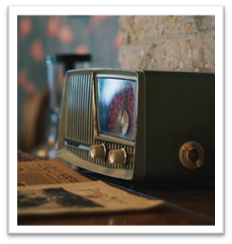How the radio can support older adults' well-being

By Dr Amanda Krause, Lecturer (Psychology) at James Cook University and 2019 Hal Kendig Research Development Program grant recipient
Follow Amanda's work at @StudyListening and www.researchaboutlistening.com
Radio occupies an important place in Australian culture, with a rich history of broadcasting and some of the largest listening audiences globally. It has particularly high engagement amongst older adults. Figures suggest that community radio reaches over 5.1 million Australians weekly and that commercial radio reaches 68% of Australians 65 years of age and older.
While there is growing evidence in favour of how engaging in the arts promotes well-being, less is known about how engaging with radio specifically might do so. Yet, our strong history of radio listening suggests it is important to consider how engaging with radio is perceived to influence listener well-being.
By conducting interviews with radio personnel and focus groups with older adult listeners, I’ve been able to establish that radio can promote listener well-being both explicitly and implicitly.
Both listeners and presenters spoke about radio’s role in delivering broadcasts during times of crisis and programs specific to health. However, there was also strong evidence that radio implicitly supports mental and social well-being.
Indeed, radio was lauded for its ability to promote communion, social connection, company, and companionship. While previous research has noted the potential for radio to develop social connections between listeners, presenters, and the wider community, I found that radio listening may go further to offset feelings of isolation. For example, listeners used the radio to create company and fill the silence while home alone, demonstrating that solitary listening may have benefits similar to that of social engagement. Further, listeners often referred to presenters as ‘friends’ – a fact not lost on radio personnel, who aim to create relationships with their listeners, and to present in ways such that listeners ‘become part of their show’. Radio’s ability to create a sense of company and companionship suggests that it can function as a social surrogate … and not only for isolated and disconnected individuals, but for any and all listening.
With this in mind, radio listening offers a non-pharmacological way to support well-being and quality of later life. Adding to the increasing evidence for how music and the arts can facilitate well-being, we now have evidence that radio also provides that support as a source of stimulation, entertainment, and social connection. The low-cost, accessibility of the radio as well as the variety of content means that it is well-placed to contribute to the promotion of well-being.
Developed via a co-design research process, my research culminated in an evidence-based resource to assist individuals, radio providers and aged care support personnel to promote individual well-being through engaging with radio. Please go to my website to download a copy.
This blog is also available as a pdf.